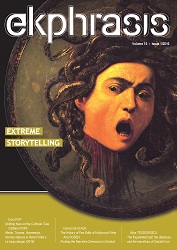Media, Trauma, Anamnesis:
Norman Manea in René Frölke’s Documentary Portrait Le beau danger (2014)
Media, Trauma, Anamnesis:
Norman Manea in René Frölke’s Documentary Portrait Le beau danger (2014)
Author(s): Cătălina BotezSubject(s): Fine Arts / Performing Arts
Published by: Universitatea Babeş-Bolyai, Facultatea de Teatru si Televiziune
Keywords: Norman Manea; René Frölke; Foucault; Holocaust trauma; child survivor; Communist totalitarianism; exile; anamnesis; transmediality; experimental media; ekphrasis; autofiction; memoir
Summary/Abstract: René Frölke’s Le beau danger takes on the condition of the survivor-writer Norman Manea and enquires into the potential of experimental media to illustrate his life and work, and thus to engage with and perpetuate the memory of affliction. This paper explores the tension between Manea’s autobiographical pieces and his promotional activity as writer via Foucault’s concept of “beau danger” or aesthetic peril, and proposes a transdisciplinary analysis of Manea’s literary reworking of multiple traumas inflicted by the Holocaust, Communist totalitarianism in Romania and trans-Atlantic exile. In it, I argue along with Frölke that empathy and identification with the pain of others is possible by means of slow and direct involvement with Manea’s prose texts and that transmediality is apt to augment and recontextualise the message passed on by literature in an appealing and highly resonant manner.
Journal: Ekphrasis. Images, Cinema, Theory, Media
- Issue Year: 15/2016
- Issue No: 1
- Page Range: 110-128
- Page Count: 19
- Language: English

